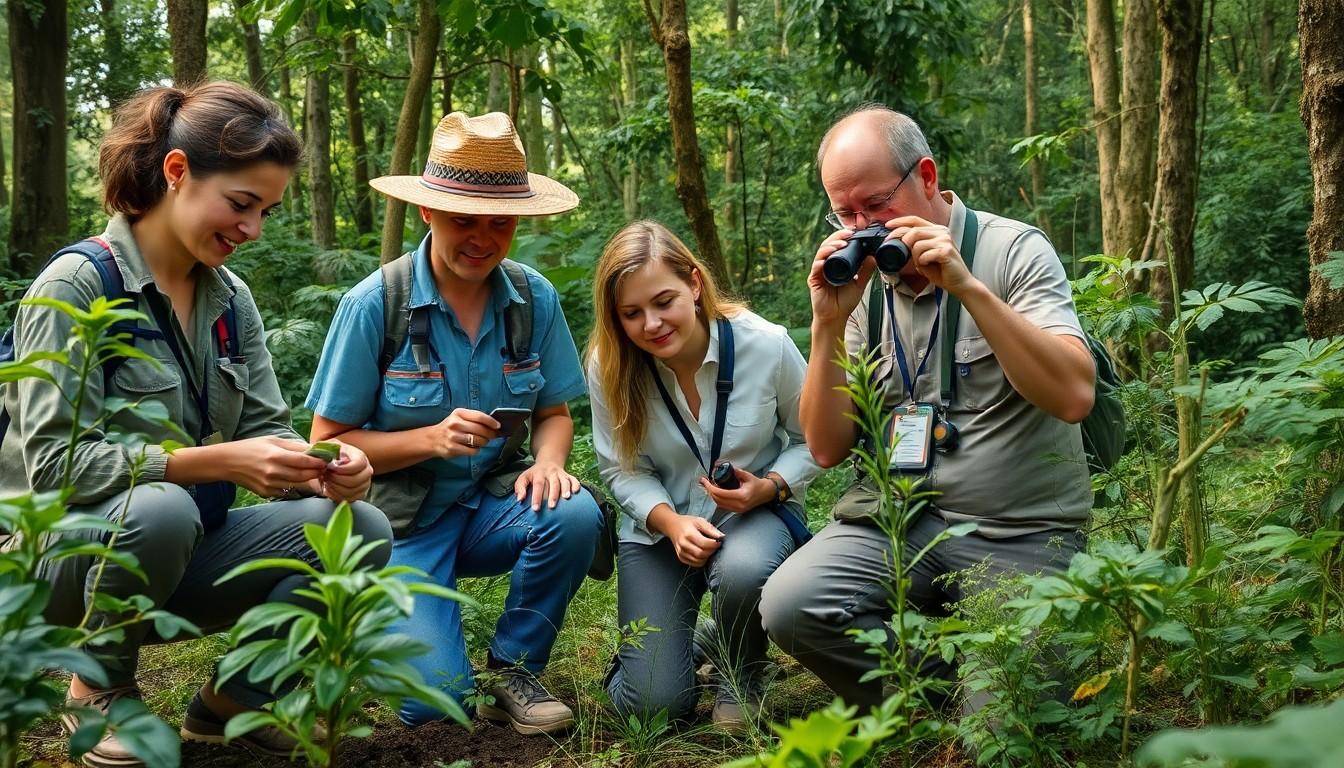In a world where nature’s beauty competes with the latest smartphone model, nature conservation jobs are the unsung heroes fighting for the planet’s soul. Imagine waking up each day with a purpose—saving endangered species, restoring habitats, and maybe even convincing a raccoon to stop raiding your trash. These roles aren’t just for tree-huggers; they’re for anyone who wants to make a real difference while enjoying the great outdoors.
Nature Conservation Jobs
Nature conservation jobs focus on protecting ecosystems and promoting biodiversity. These positions encompass a range of roles, including ecologists, wildlife biologists, and environmental educators. Each role contributes uniquely to the mission of environmental preservation.
Ecologists study the relationships between organisms and their environments, conducting field research to gather critical data. Wildlife biologists monitor animal populations, assessing their health and habitats to develop conservation strategies. Environmental educators raise community awareness about ecological issues, fostering a greater understanding of conservation’s importance.
In addition to these roles, many organizations offer opportunities in management and policy. Conservation managers oversee projects, ensuring compliance with environmental regulations. Policy analysts advocate for sustainable practices, influencing legislation at local, state, and national levels.
Nature conservation careers often require a solid educational background in environmental science or related fields. Many employers prefer candidates with experience, whether through internships, volunteer work, or relevant coursework. Networking within the field significantly enhances job prospects, as connections often lead to opportunities.
The growth of environmental concerns has increased demand for professionals in this sector. As awareness of climate change and habitat loss rises, nature conservation jobs remain vital in addressing these challenges. People pursuing these careers benefit from fulfilling work that positively impacts the planet and promotes a sustainable future.
Types of Nature Conservation Jobs
Various types of nature conservation jobs exist, each playing a critical role in environmental protection and sustainability.
Field-Based Positions
Field-based positions primarily focus on hands-on conservation activities. Ecologists conduct field studies to observe species interactions within their habitats. Wildlife biologists monitor endangered animals to gather essential data for conservation planning. Additionally, conservation technicians support practical efforts in wildlife preservation, including habitat restoration projects. These positions demand strong observational skills and the ability to work in diverse weather conditions, making them ideal for those who enjoy the outdoors.
Research and Academic Roles
Research and academic roles involve in-depth investigations into ecological systems and conservation methodologies. University professors and researchers study theoretical aspects of conservation, contributing to scientific knowledge through published findings. They also guide students in understanding complex environmental relationships. Research assistants typically help with data collection and analysis, providing valuable support for larger projects. These careers require advanced degrees, offering the opportunity for individuals to impact conservation practices significantly.
Policy and Advocacy Careers
Policy and advocacy careers focus on shaping conservation legislation and promoting sustainable practices. Conservation managers develop and implement strategies for protecting natural resources effectively. Policy analysts analyze environmental regulations and their impacts on communities and ecosystems. Advocacy specialists work with organizations to influence public policy, raising awareness about critical conservation issues. Strong communication skills and a deep understanding of environmental laws are essential for success in these roles, highlighting the importance of addressing both scientific and societal dimensions of conservation.
Skills Required for Nature Conservation Jobs
Nature conservation jobs require a combination of specific skills to ensure effective preservation efforts. The roles attract diverse candidates, each bringing essential expertise to the field.
Scientific Knowledge
Scientific knowledge serves as the foundation for many nature conservation roles. Professionals in this sector often possess a deep understanding of ecology, biology, and environmental science. They analyze ecological systems and assess the health of populations and habitats. Familiarity with data analysis techniques proves valuable, as individuals may conduct research studies and interpret findings. Knowledge of specific laws and regulations regarding environmental protection also plays a critical role. Experts must remain updated on advances in conservation methods. This ongoing education can enhance field effectiveness and inform strategy development.
Communication Skills
Communication skills are equally vital for success in nature conservation jobs. Professionals often collaborate with various stakeholders, including government agencies, non-profits, and the public. They must convey complex scientific concepts in easily understandable terms to engage community members and policymakers. Presentations and written reports are common duties requiring clear and persuasive messaging. Building relationships with diverse audiences exerts a significant influence on promoting conservation initiatives. Effective listening skills also contribute to understanding stakeholder needs and addressing concerns. Engaging storytelling techniques help raise awareness about environmental issues, strengthening public support.
Project Management
Project management skills greatly enhance the effectiveness of nature conservation initiatives. Professionals frequently oversee multiple projects with tight deadlines and limited budgets. They coordinate resources, timelines, and team responsibilities efficiently. Successful managers prioritize tasks and adapt strategies based on evolving conditions. Budgeting and fundraising expertise further supports project sustainability. Utilizing project management software can streamline communication and task tracking among team members. Flexibility and problem-solving abilities ensure that unexpected challenges are resolved promptly. Overall, strong project management remains integral to achieving conservation goals and maintaining ecological balance.
How to Find Nature Conservation Jobs
Finding nature conservation jobs involves utilizing various strategies and resources. It’s essential to tap into both networking avenues and hands-on experiences for greater visibility in the field.
Networking and Resources
Connecting with professionals in nature conservation opens doors for exciting opportunities. Attending conservation-focused events allows individuals to meet like-minded people who share a passion for the environment. Joining local and national organizations, such as the Society for Conservation Biology or the National Wildlife Federation, provides access to job boards and networking events. Social media platforms like LinkedIn and Facebook can also facilitate connections with industry experts. Utilizing online forums to engage in discussions about conservation strategies aids in broadening professional horizons. These interactions increase chances of finding job openings and mentorship opportunities.
Internships and Volunteer Opportunities
Gaining hands-on experience through internships offers valuable insights into the conservation field. Many organizations, including governmental agencies and non-profits, provide structured internship programs that present practical skills. Volunteer opportunities serve as another pathway for involvement, allowing individuals to contribute to local conservation efforts while enhancing their resumes. These positions often require diverse tasks, from assisting with wildlife surveys to participating in habitat restoration. Commitments range from a few weeks to several months, accommodating students and full-time workers alike. Through these initiatives, aspiring conservationists build essential skills and create connections that pave the way for future employment in nature conservation roles.
Sustainable Future For our Planet
Nature conservation jobs play a crucial role in preserving the planet’s ecosystems and biodiversity. These careers not only offer a chance to make a significant impact but also provide the opportunity for personal fulfillment through outdoor experiences. With a variety of roles available from fieldwork to policy advocacy there’s a place for everyone passionate about environmental protection.
As the demand for skilled professionals in this sector continues to grow individuals interested in pursuing these careers can benefit from networking and gaining hands-on experience. By developing essential skills and connecting with like-minded professionals aspiring conservationists can find rewarding paths that contribute to a sustainable future for our planet.


